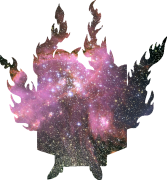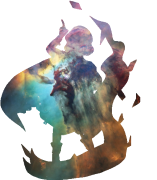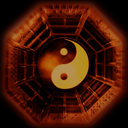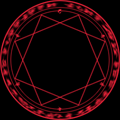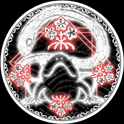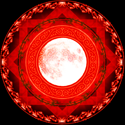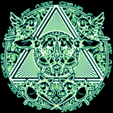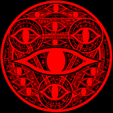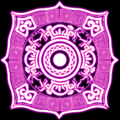Divination
There's a school of thought that says basically anything can be a system of divination, and that divination practices are about cultivating a certain kind of abilities and sensitivities, essentially a kind of ”dialogue with the world”. Some have more mundane interpretations of this dialogue, other more numinous. It is ultimately up to you to judge which it is.
However, it is good to begin with a structured tradition of divination. The two big ones are the I Ching and the Tarot. Both are such deep topics that they would deserve pages and pages of analysis, so a brief glance will have to do at this time.
I Ching
I Ching comes from China. To put it in briefly, it is a system that produces a hexagram – collection of six lines – that may then change into another hexagram. This hexagram or sequence of them describes the factors surrounding your query and how they might change, or what kind of impacts taken actions might have. These descriptions come in short written poetic, storylike texts known as the Ten Wings Commentary. Most interpretations of I Ching focus on this textual element. There are however other ways to approach this process.
The I Ching operates on Chinese ideas such as yin and yang, the five wu xing and the bagua. Each of the 64 I Ching hexagrams are constructed from two bagua trigrams. The trigrams in turn are three yin or yang lines. Two yin or yang lines make up younger (changing) or elder (unchanging) yin or yang.
One can easily find sources in I Ching which gloss over this kind of ”emanation” of the hexagrams, but delving into these concepts and how they come together to make up the hexagrams is a good way to get familiarized with these ideas. Understanding these systems and their correspondences will bring further depth and nuance to I Ching divination. There are schools of I Ching divination which actually entirely ignore the Ten Wings Commentary and focus on the constituent bagua trigrams and how they change or correspond to the query.
The I Ching hexagrams can be produced via a number of means. Traditionally these include the more laborious yarrow stalk method and the more approachable coin toss method. The hexagrams can however also be generated via counting beans or rice, throwing cowrie shells, astrology, even observing patterns of the wind...
Benebell Wen's I Ching: The Oracle is kind of the English language gold standard for spiritually-minded use of I Ching. She states that the Oracle appears to be a spirit in itself with it's own nature. It certainly seems to produce very different results from Tarot, having a sagely, restrained nature that consistently appeals to the highner nature in humanity.
Tarot
Tarot is a divination system based on Tarot cards. They started their life as Tarocco playing cards in Renaissance era Europe, and later had extensive mythology projected upon them. Cartomancy as a divination art seems to have developed earlier than modern Tarot, so there is historical basis for their use in divination, if such a thing matters.
The Tarot symbolism reflects ideas from the Western esoteric tradition. The include the various characters of the Major Arcana, which are representations of various kinds of strong archetypes. The Minor Arcana represent more event or phenomena-like things, and they are categorized into four categories correspondencing with the four classical Western elements. The language of the Tarot is less systematic and nonverbal than that of the I Ching and relies strongly on visual cues. The variety of designs can end up having different meanings. Some argue that the ”original” Rider-Waite designs are the best for parsing out the visual symbolism.
There are an immense amount of resources for the Tarot in English, to the point where it's difficult to make recommendations. Anthony Louis’ Tarot Plain and Simple could be a good starting point. The Tarot also seems to have a spirit of it's own, but it is more difficulty and tricksterish than the I Ching. This is likely a combination of it's origin as a game, the kind of mythologization it was born out of and the forced secrecy and intense symbolism that European esoteric tradition had to veil itself into. Experiences may vary, but vague consensus seems to be that the I Ching is more sagely and the Tarot is more ”schizo”.
Which one to study?
Nothing prevents you from studying both systems and using them in a supplementary manner. Some have even attempted to draw correspondences between these systems. Whether they are good or not is up for you to judge. Benebell Wen is the latest to attempt to build such a bridge, and she had to invoke the existence of a ninth, ”hidden gua” to make it work. While the existence of such a thing is justifiable within the Chinese tradition, one can also argue it might be Tarot's schizo energies leaking into to the orderly Chinese system...
Which system you choose to go with is up to you, but I Ching does seem to produce bit clearer, more legible results. It's connection to Chinese and therefore East Asian thought also be of interest to those coming from Touhou.
It should be noted that you can also use divination systems as tools to contact spirits. You can invoke spirits to speak through your chosen system, and there are ways for them to give out answers via these systems in other ways, such as dreams or visions involving the hexagrams or Tarot symbolism.
What about the Whispered Oracle?
The Whispered Oracle of Hakurei Shrine is a canonical Touhou fortune telling book that is based on the Japanese omikuji system. There is nothing stopping you from using it, but I believe it’s good to start learning either I Ching or Tarot, because they also educate you on the esoteric concepts of their respective cultural sphere. For some specific questions, Whispered Oracle might be more legible than I Ching or Tarot. Do experiment with it if you feel like it!
How often to divine?
It's very tempting to overdo it in the beginning, but such will quickly blur whatever message the system is trying to convey. A good baseline would perhaps be 1-3 divinations per week and put real effort into understanding what the system is trying to convey.
Perhaps a good early practice would be at the end of every week asking your chosen system ”How can I make the best of the coming week?”, and then at the end of each week comparing how the last week's divination played out. From there on out, you can expand it to help you with situation where you are uncertain how to approach.



